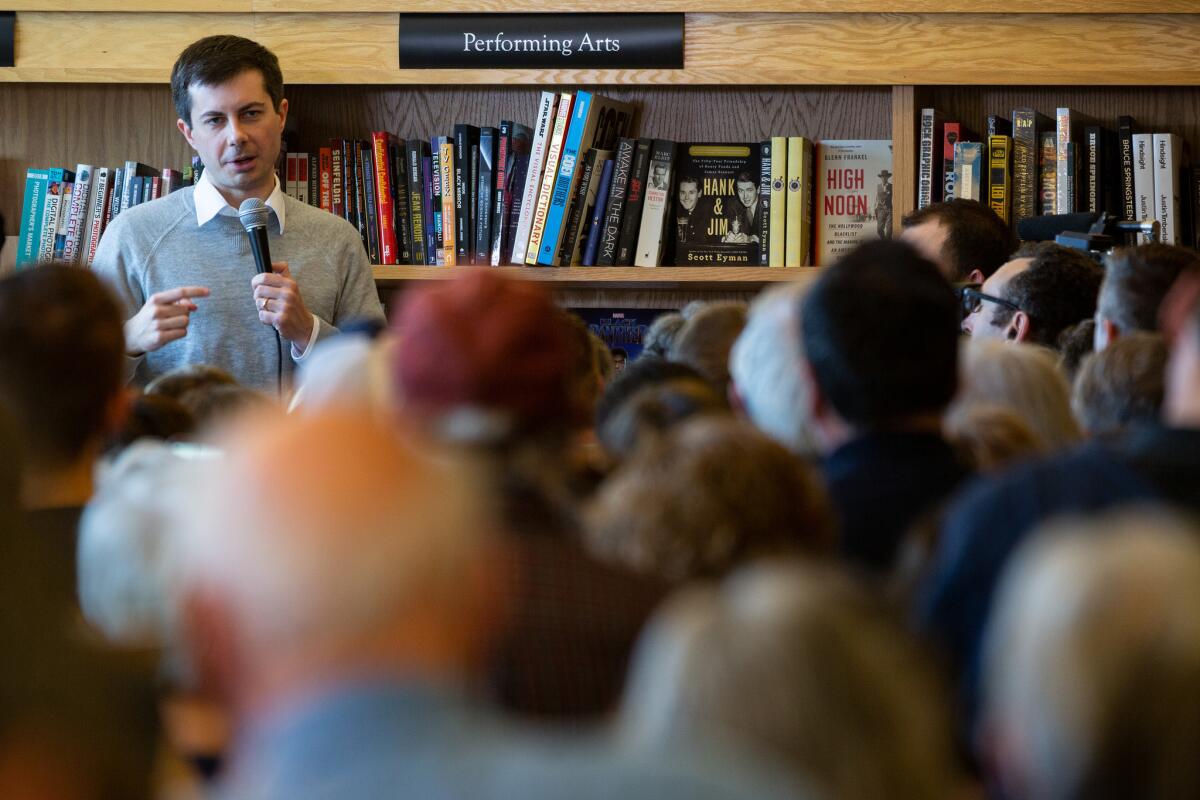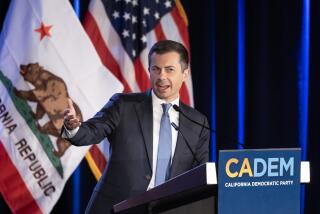Mayor Pete Buttigieg is the hottest thing in politics. Can it last?

- Share via
Reporting from Manchester, N.H. — Pete Buttigieg was home recently, back in the Indiana city where he was born and serves as mayor. He was at the library on Main Street, at a book signing for his autobiography, and everything seemed familiar, the way it’s always been.
Only not.
“People looked at me like I was some kind of celebrity,” he said, “and it was in South Bend, and I was thinking, ‘You guys know me. We’ve been in this very same room and you’ve been yelling at me about neighborhood stuff.’ It was like I was a different person.”
That’s what it is like to be the breakout star of the 2020 presidential campaign and, for the moment, the hottest thing in American politics.
The Democratic upstart with the inscrutable surname (pronounced BUDDHA-judge) and platinum resume — Rhodes scholar, business consulting background, Afghanistan war vet — has raised an impressive $7 million, begun climbing in polls and become the unlikely pace-setter for engagement on social media.
If Democrats think the way to beat President Trump is through contrast, Buttigieg offers a stark one.
There is, of course, his youth. He is 37. It will be 2054, he tells audiences, by the time he is as old as the president.
There’s his husband, Chasten, who has become a top campaign surrogate, with nearly a quarter of a million followers of his lively Twitter account.
There’s Buttigieg’s distinctly unopulent upbringing as the son of Notre Dame professors, his Mr. Rogers haircut and Howdy Doody grin, and, perhaps more than anything, his brainy yet straightforward manner of speaking.
The obvious challenge for Buttigieg is thriving beyond what he himself calls this “flavor of the month” phase. He needs to rapidly grow his campaign, to compete against better established candidates with larger and more sophisticated operations. He must brace for harsher scrutiny from voters taking second or third looks, and a more thorough going-over by a less fawning media.
But consider where he’s started and what he’s attempting: If elected, Buttigieg would be the youngest president in U.S. history, the first openly gay chief executive and the first candidate ever to go directly from City Hall to the White House. Building on unexpectedly early success leaves little room for complaint.
“It’s a good problem to have,” he said dryly.
::
As he prepares to formally declare his candidacy Sunday in South Bend, the two-term mayor has become ubiquitous on radio and TV, making it easier to list the shows Buttigieg has not appeared on, among them “Sesame Street” and “Game of Thrones,” than all he has.
The world has come to know his favorite books (which include “Ulysses” and “The Little Prince”), the fact he learned Norwegian to read a novel, as well as 10 things Buttigieg can’t live without (durable wool socks and blue felt-tip pens are two of them).
If it all seems a bit over the top, he wouldn’t disagree. “It’s weird,” Buttigieg acknowledged, shortly before appearing at the art museum in Manchester, N.H., a much larger venue than originally planned but still too small for the 200 or so turned away.
He swept in on a tidal wave of hype, and before Buttigieg said a word, hundreds shouted his name — the Pete part, anyway — then renewed the whoops and cheers when he strode up a ramp to give the throng a better view.
“I’m probably not what you picture when you’re thinking about your next president,” Buttigieg said.
“Yes, you are!” a voice cried, and when the audience roared, Buttigieg responded with a happy bit of understatement.
“Well,” he said, “we’re getting somewhere.”
It’s the electoral college, stupid. And the Supreme Court. And the filibuster ... »
::
Buttigieg doesn’t shrink from attacking Trump and his administration. In a CNN town hall, the March appearance that launched his vertiginous ascent, Buttigieg was scathing in his criticism of Indiana’s devoutly Christian former governor, Vice President Mike Pence.
“How could he allow himself to become the cheerleader of the porn-star presidency?” Buttigieg gibed. “Is it that he stopped believing in Scripture when he started believing in Donald Trump?”
When he refers to Washington as a grotesque but mesmerizing spectacle, Democrats have no doubt who and what he means. “We can’t take our eye off that show,” he said, and hundreds of partisans packed into a Concord, N.H., bookstore laughed knowingly.
But it’s a mistake, he suggests, to think that sort of bombardment will win back the White House.
“What matters is our everyday life,” he said, “and our everyday life is subject to the decisions that are being made by people with power over our life, and that’s what elections are all about.”
He isn’t bound at the feet by a history of Washington politics. I think that’s a healthy thing for the country right now.
— Kathy Biberstein of Maine, on Pete Buttigieg
Buttigieg delivers a short and punchy stump speech, heavy on Democratic catechism — the sanctity of Medicare, support for universal healthcare and legalized abortion, fighting climate change, reining in corporate political influence — but one largely devoid of specifics, beyond eliminating the electoral college in favor of a popular vote for president.
The omission, he says, is purposeful, serving as an implicit rebuke of past Democratic nominees who often seemed to emphasize bloodless 14-point programs over personal connection. (He doesn’t mention Hillary Clinton or Al Gore, but both come to mind.)
He rejects “the idea that you experience an election through kind of an escalating series of policy papers,” as Buttigieg put it during an interview at a Frenchified cafe in downtown Manchester. “Especially in a party where … 80% of our messages are going to converge.
“So many other things matter,” he said, “especially having a sense of who you are and what you care about.”
The fact Buttigieg is quite unlike anyone who has ever contended for the White House — “definitely the only left-handed, Maltese American Episcopalian gay millennial war veteran in the race,” he jokes — leaves him thoroughly unfazed.
::
It may be presumptuous to seek the presidency a bare two years above the minimum-age requirement, but the youngest candidate in the Democratic field suggests he has greater standing than most.
“This is, after all, the generation that’s going to be on the business end of climate change for as long as we live,” he told his Manchester audience. “This is the generation that contributed most of the troops in the conflicts after 9/11 and has the most at stake in our figuring out a way to put an end to endless war.
“This generation, if nothing changes, could be the first in American history to earn less than our parents if we don’t do something different. So let’s do something different.”
For all his newness, Buttigieg is not above falling back on an old trope, the attack on Washington and denizens of its two major parties.
Better the hands-on mayor of a mid-sized city, he says when questioned about his credentials, than some elder who’s spent decades “marinating” inside the Beltway. Better a problem solver than someone who worries about winning the day in some committee hearing. (Might he refer to the many congressional lawmakers vying for the nomination?)
Being gay isn’t the centerpiece of his campaign. He’s not running to make a statement or champion LGBTQ rights. But Buttigieg doesn’t downplay his sexual orientation. He tells audiences his marriage was possible “by the grace of one vote on the Supreme Court,” an observation that makes a larger point about Washington’s impact on the day-to-day lives of voters.
No longer a political winner: Silicon Valley is a minefield for 2020 hopefuls »
The combination of freshness and Middle American pedigree was intriguing enough that Maine resident Kathy Biberstein drove nearly five hours round-trip to catch Buttigieg in Manchester. While it’s far too early to commit to a candidate, the 60-year-old retired corporate attorney said, she appreciated someone who could “think through ideas, not just throw barbs back at Donald Trump.”
“I still don’t know if he can win,” she said. “But he isn’t bound at the feet by a history of Washington politics. I think that’s a healthy thing for the country right now.”
Inevitably, there are stirrings of a Buttigieg backlash.
Critics on the left have questioned his liberal credentials, while the right-leaning Wall Street Journal editorial page questions his moderation. He’s been forced to defend his past employment with the McKinsey & Co. consulting firm and to fend off accusations of racial insensitivity as mayor.
(He said he had nothing whatever to do with McKinsey’s complicity in the opioid crisis — “my specialty was grocery prices, but I also worked on renewable energy” — and expressed regret for having used the phrase “all lives matter” in a manner some perceived as denigrating the “Black Lives Matter” movement.)
Like a community theater troupe that suddenly finds itself on the big stage, Buttigieg’s campaign has struggled to keep up with his new fame.
He showed up more than half an hour late for his appearance in Concord and prompted no small amount of grumbling when he spoke for barely 15 minutes, then posed for pictures.
“A rushed speech, a photo line and no Q&A is not the way we do things around here,” said Sarah Ovenden, 55, a travel consultant who drove an hour from Guilford, Vt., to share with Buttigieg her concerns about the national rail system. “That’s very un-New Hampshire-ish.”
A campaign spokeswoman said the cramped, overheated conditions were ill-suited to a prolonged appearance and promised Buttigieg would return often and answer many questions.
The biggest one: Can he quickly scale up to transform himself from curiosity into a serious contender for president?
“We can now,” Buttigieg told reporters, “and we have to.”
More to Read
Get the L.A. Times Politics newsletter
Deeply reported insights into legislation, politics and policy from Sacramento, Washington and beyond. In your inbox twice per week.
You may occasionally receive promotional content from the Los Angeles Times.











